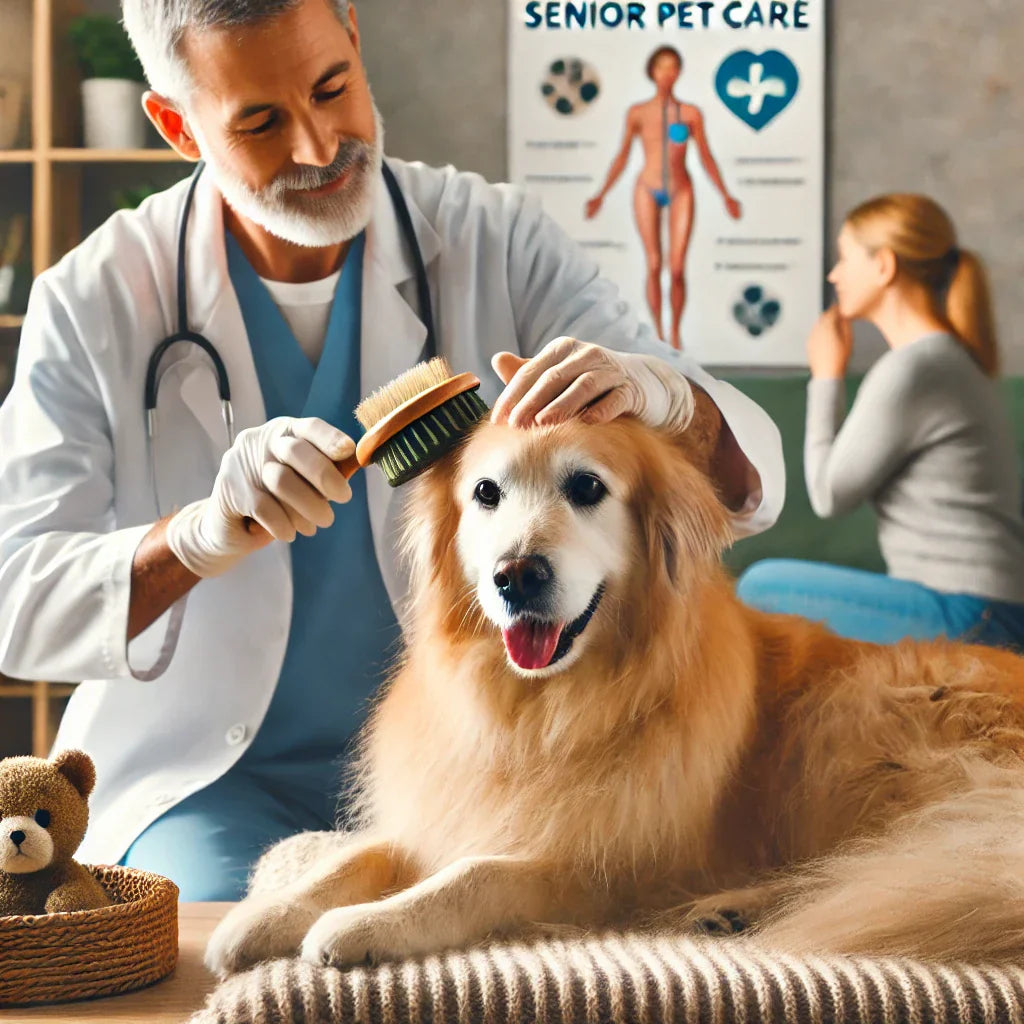
Caring for Senior Pets: Essential Tips for Their Health and Happiness
Share

Introduction: Why Senior Pet Care Matters
As pets grow older, their needs change significantly, requiring extra attention, specialized nutrition, and regular health check-ups. Senior pets may develop mobility issues, dental problems, weight changes, and cognitive decline, making proactive care essential for their comfort and longevity.
What You’ll Learn in This Guide:
✔ How to recognize common aging signs in pets
✔ Adjustments to make for senior pet comfort
✔ Best nutritional choices for older pets
✔ How to support mobility and exercise safely
🐾 Identify distress signals early to prevent serious health issues—regular health monitoring keeps aging pets comfortable.
1. Recognizing the Signs of Aging in Pets
📌 What Are the Most Common Signs of Aging in Pets?
🚨 Physical Signs:
✔ Reduced mobility (stiffness, limping, reluctance to jump or climb).
✔ Weight changes (unexpected weight loss or gain).
✔ Dental issues (bad breath, difficulty chewing, drooling).
✔ Vision or hearing loss (bumping into objects, lack of response to sounds).
🚨 Behavioral Changes:
✔ Increased sleep or changes in sleeping patterns.
✔ Less interest in physical activity or playtime.
✔ Confusion, disorientation, or anxiety.
🐾 Catch illnesses early with these warning signs—early detection ensures better management of senior pet health.
2. Veterinary Care for Senior Pets: How Often Should They See a Vet?
📌 Why Are Regular Check-Ups Important for Aging Pets?
Senior pets should visit the veterinarian at least twice a year for comprehensive wellness exams. These visits help detect and manage conditions like:
✔ Arthritis – Joint pain that affects mobility.
✔ Heart disease – Common in older pets.
✔ Kidney & liver issues – Requires diet adjustments.
✔ Dental disease – Prevents pain and infection.
What to Ask Your Vet During Senior Pet Check-Ups?
✅ Should I adjust my pet’s diet based on their age?
✅ How can I help manage joint pain and mobility issues?
✅ What vaccinations are still necessary for my senior pet?
✅ Are there supplements that can improve my pet’s overall health?
🐾 Ensure your home is a safe space for your pet—regular vet visits ensure long-term well-being.
3. Nutrition for Senior Pets: Adjusting Diet for Longevity
📌 What Are the Nutritional Needs of Aging Pets?
As pets age, their metabolism slows down, requiring adjustments to prevent obesity and nutrient deficiencies.
✔ Higher Protein: Supports muscle maintenance and immune function.
✔ Healthy Fats (Omega-3s): Supports joint health and cognitive function.
✔ Lower Calories: Prevents weight gain due to reduced activity.
✔ Fiber: Helps improve digestion and prevents constipation.
🚨 What Foods Should Senior Pets Avoid?
❌ High-fat treats (can contribute to obesity).
❌ Hard kibble (difficult to chew with dental issues).
❌ Excessive carbs (can cause energy crashes).
🐾 Pair vaccinations with proper nutrition for optimal pet health—balanced diets help prevent age-related diseases.
4. Exercise & Mobility Support for Senior Pets
📌 How Can You Keep Older Pets Active Without Risking Injury?
🚨 Safe Exercise Routines for Senior Pets:
✔ Short, gentle walks instead of high-impact running.
✔ Swimming or hydrotherapy to reduce joint strain.
✔ Interactive toys & scent games for mental stimulation.
📌 How to Support Mobility in Aging Pets?
✔ Use orthopaedic pet beds to support ageing joints.
✔ Install pet ramps to help them access furniture safely.
✔ Non-slip flooring prevents accidental falls.
🐾 Take steps to prevent serious mobility issues with early support—proper care helps aging pets stay active longer.
5. Managing Weight & Preventing Obesity in Senior Pets
📌 Why Is Weight Management Important for Aging Pets?
🚨 Health Risks of Obesity in Senior Pets:
✔ Increased strain on joints – Leads to arthritis.
✔ Higher risk of diabetes & heart disease.
✔ Reduced lifespan due to metabolic stress.
📌 How to Maintain a Healthy Weight?
✔ Controlled portion sizes – Avoid overfeeding.
✔ Scheduled meals instead of free feeding.
✔ Vet-approved diet plans to meet their specific caloric needs.
🐾 Recognizing Signs of Pet Distress and Saving Them in Time—managing weight prevents long-term health problems.
6. Grooming & Dental Care for Senior Pets
📌 How Does Grooming Help Senior Pets Stay Healthy?
🚨 Senior Pet Grooming Checklist:
✔ Brush fur regularly to prevent matting and discomfort.
✔ Trim nails frequently to avoid joint stress.
✔ Check ears & eyes for signs of infection.
📌 Dental Care for Aging Pets:
✔ Regular dental check-ups prevent gum disease and tooth loss.
✔ Soft, senior-friendly chews for gentle cleaning.
✔ Brush teeth 2–3 times per week using pet-safe toothpaste.
🐾 Don’t forget about senior pets—here’s how to care for them—routine care keeps them comfortable in their golden years.
7. Mental Stimulation & Emotional Well-Being for Senior Pets
📌 How to Keep Senior Pets Mentally Engaged?
✔ Puzzle feeders to keep their mind sharp.
✔ New walking routes to expose them to new scents.
✔ Gentle play sessions to maintain engagement.
🚨 Signs of Cognitive Decline in Senior Pets:
✔ Increased confusion or getting lost in familiar places.
✔ Changes in sleep patterns or pacing at night.
✔ Forgetting house training or basic commands.
🐾 Complement vaccines with natural remedies for minor ailments—stimulation supports brain health.
